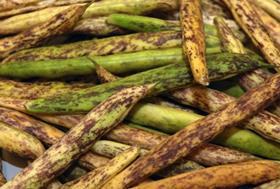
It has been 20 years since the Coco de Paimpol gained its Appellation of Controlled Origin, earning the EU-wide protected designation of origin the following year.
The Breton haricot bean is grown in the area of Paimpol, in the French department of Côtes d’Armor, a region with an oceanic climate and loamy soil ideal for optimum quality.
Each season, 2,000 pickers come to harvest the 700ha in Paimpol between July and the end of October, alongside the 200 producer members of marketer Prince de Bretagne.
In 2017, outstanding yields kept volumes stable despite a 25 per cent decline in the production area. Thanks to a dynamic market, producers were able to fetch an average price of €1.45 per kilogram.
However, the result succeeded solely in camouflaging the scale of the challenges ahead.
This year, the decline in the production area has continued due to new regulations prohibiting certain treatments against harmful insects, with producers now predicting significant decreases in both volume and turnover.
Producers have put rules in place to regulate the volumes harvested from late August onwards in order to allow inputs to be distributed throughout the season and adapt supply to meet consumer demand.
In addition, producers are considering developing new consumption patterns for the product, just as they did in 1948 when the fresh market was first opened up for Coco de Paimpol. Such efforts illustrate the sector’s enviable capacity to organise.
'The success of Coco's 20th anniversary celebrations shows consumers' commitment to authentic, high-quality products,” said Hervé Guézou, president of the UCPT, the cooperative union for Paimpol and Tréguier. “The support of consumers and various personalities, especially political, has given us producers the strength to continue in this way.”



